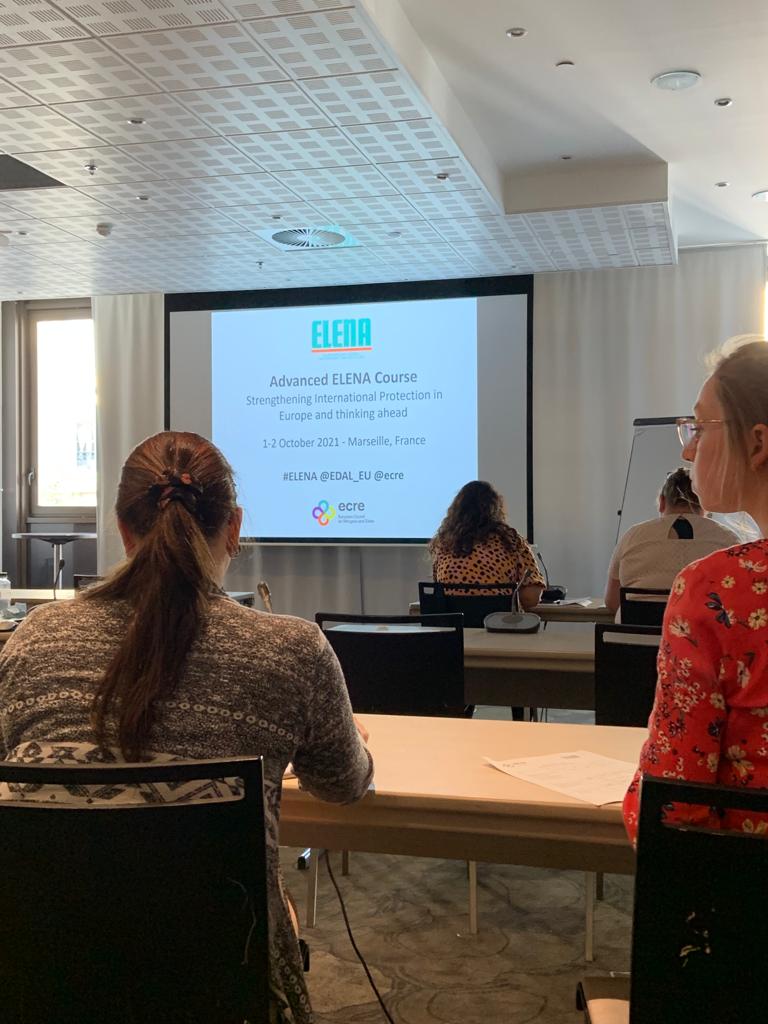In October three of our lawyers attended an advanced course on strengthening international protection. Neil (Director), Alexis (Legal Officer) and Mireille (Junior Legal Officer) spent 3 days in Marseille participating in engaging discussions and workshops, whilst also networking with our friends and colleagues in other Member States.
Why do we attend these events? What are the benefits to our work, and to our beneficiaries?
So as to ensure that the highest standards of human rights are maintained within the domestic system vis-a-vis refugees and asylum-seekers, it is necessary to keep abreast of the ongoing changes implemented at European law and International law particularly in relation to the developments in case law decided by the European and International courts.
In view of this, aditus foundation has been a member of the European Legal Network on Asylum (ELENA) within the European Council for Refugees and Exiles (ECRE) for several years, contributing to the conferences, training and promoting cooperation on individual cases. Most recently, we attended the Advanced ELENA Course 2021: ‘Strengthening International Protection in Europe and Thinking Ahead’ training.
Our participation was made possible thanks to the support of UNHCR Malta.

Throughout this training we focused on the jurisprudence of the Court of Justice of the European Union (CJEU) and the European Court of Human Rights (ECtHR), particularly in terms of interim measures, the entry into force of Protocol No. 15 to the ECHR, blockchain technology in relation to access to health, cessation of international protection, complaints to the European Ombudsman and various specialised workshops.
A brief overview of some of the topics covered during the ELENA Course 2021 is provided below.
Interim Measures
In terms of Article 3 of the ECHR relating to the prohibition of torture or inhuman and degrading treatment, there exists an obligation on the contracting state with regard to the expulsion of third-country nationals who are not lawfully recognised by the said state, where substantial grounds for a breach of this right exist. Rule 39 of the Rules of the Court and new practices of the ECtHR allows any party or person concerned to request an interim measure to ensure that states do not breach this obligation and thus ensures the protection of the rights of the parties.

It is evident through case law that such interim measures are only issued by the Court if there is an “imminent risk of irreparable damage”[1] so as “to facilitate the effective exercise of the right of individual petition under Article 34 of the Convention”[2], and so in such circumstances the state is bound to comply with the interim measure.
A risk assessment must be carried out to determine whether there are sufficient grounds to request such a measure. These must be objective, show that the risk is imminent, confirm that the party has exhausted national suspensive remedies and demonstrate the level of severity the harm faced by the party.
There are certain procedural requirements for these applications to be accepted by the Court including: they should be submitted in writing during the Court registry’s working hours, they must be substantiated by evidence and facts of the case and must contain basic, personal and practical information.
Additionally, documentation must be provided to substantiate any claims included in the request.
Protocol No. 15 to the ECHR
This has entered into force on the 1 August 2021 and has made some changes to the ECHR. These include the following: reference is made to the principle of subsidiarity and the margin of appreciation doctrine in the Preamble, the term for submission of an application before the ECtHR has been reduced to four months with effect from the 1 February 2022, removal of the admissibility criterion of “significant disadvantage”, parties to a case may no longer object to its relinquishment by a Chamber in favour of the Grand Chamber and candidates for a post of judge at the Court must be less than 65 years of age.[3]
Cessation of International Protection
At EU law, the cessation of international protection is envisaged in terms of Article 11 of the Qualification Directive in relation to refugees and Article 16 of the same Directive in relation to beneficiaries of subsidiary protection.
‘Cessation’ relates to the withdrawal of international protection by the state if the circumstances which gave rise to persecution cease to exist.
For such withdrawal to be lawfully recognised the state must determine whether such change in circumstances is significant and non-temporary.
In the case of Abdulla, a preliminary reference was submitted to the CJEU to determine the interpretation of Article 11(1)(e) of the above-mentioned Qualification Directive. The Court concluded that refugee status “ceases to exist when the circumstances which justified the individual’s fear of persecution in terms of Article 2 (c) of the Directive and that person has no other fear of persecution“. For the purposes of assessing a change in circumstances, the responsible state must determine whether “the actor or actors of protection referred to in Article 7(1) of Directive 2004/83 have taken reasonable steps to prevent the persecution, that they therefore operate, inter alia, an effective legal system for the detection, prosecution and punishment of acts constituting persecution and that the national concerned will have access to such protection if he ceases to have refugee status.“[4].
Therefore, this case sets out the standard of proof for the cessation of international protection which rests on the state. Despite this, it must be noted that changes in personal circumstances such as divorce, family reunification and minors reaching adulthood may also lead to cessation.

Recent Jurisprudence of the CJEU
In the case of the Commission v Hungary judgment of 17 December 2020[5], the CJEU ruled against Hungarian legislation which required asylum applications to be lodged in person and exclusively in particular transit zones. The Court stated that this legislation prohibited access to the asylum procedure and declared it to be in violation of the rights envisaged by Articles 3 and 6 of Directive 2013/32/EU.
Additionally, the Court stated that “when a person makes an application for international protection to an authority competent under national law for registering such applications, the registration is to take place no later than three working days after the application is made…if the application for international protection is made to other authorities which are likely to receive such applications, but not competent for the registration under national law, Member States are to ensure that the registration takes place no later than six working days after the application is made.”[6]
In view of the ongoing legislative amendments and developments in case law within the sphere of asylum law as underlined above, it is of vital importance to continually streamline one’s knowledge to ensure that the necessary standards are maintained within the domestic system and that legal practitioners are equipped to protect the rights of asylum seekers and refugees alike.
[1] Mamatkulov and Askarov vs. Turkey [GC] 46827/99 and 46951/99, 4 February 2005.
[2] Ibid.
[3]Protocol No. 15 amending the Convention on the Protection of Human Rights and Fundamental Freedoms <https://www.echr.coe.int/Documents/Protocol_15_ENG.pdf>.
[4] Aydin Salahadin Abdulla and Others V Bundesrepublik Deutschland Joined Cases C-175/08, C-176/08, C-178/08 and C-179/08, 2 March 2010 <https://eur-lex.europa.eu/legal-content/EN/TXT/?uri=CELEX%3A62008CJ0175>.
[5] C 808/18 Commission v Hungary, judgment of 17 December 2020.
[6] Ibid.
